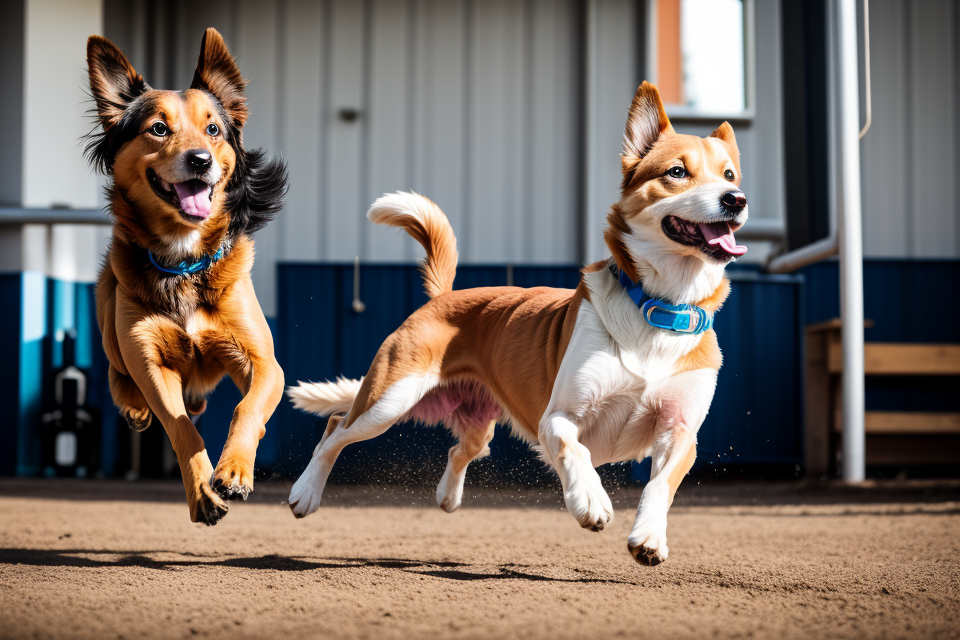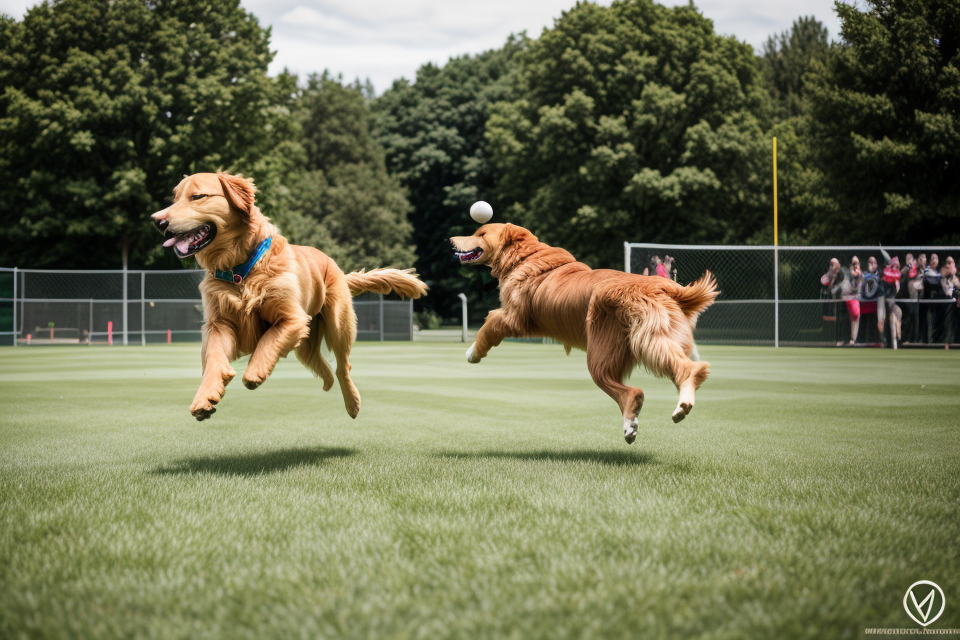Fetch is a classic game that has been enjoyed by dogs and their owners for centuries. But have you ever wondered if dogs really need to be trained to play fetch? After all, it seems like such a simple game, doesn’t it? Well, the answer may surprise you. The truth is, dogs are naturally inclined to play fetch, but they can benefit from training to improve their skills and enjoy the game even more. In this article, we’ll explore the science behind canine fetch intelligence and discover why training is essential for both you and your furry friend. So, get ready to learn why fetch is more than just a fun game for your dog!
The Fetch Game: Understanding the Behavior of Dogs
The Natural Instinct of Chasing and Retrieving
How Chasing and Retrieving Benefits Dogs
Dogs have a natural instinct to chase and retrieve objects. This behavior is deeply ingrained in their genetic makeup and has been honed through thousands of years of domestication. Dogs were originally bred for hunting and guarding, and their ability to chase and retrieve prey was essential for their survival. Even today, this instinct is still present in modern breeds of dogs, even those that are not traditionally used for hunting.
How Chasing and Retrieving Relates to Fetch
The game of fetch is a simple yet enjoyable activity for dogs that allows them to utilize their natural instinct to chase and retrieve objects. The game is played by throwing an object, such as a ball or a toy, for the dog to chase and then retrieve. This activity not only satisfies the dog’s natural instinct but also provides mental and physical stimulation, which is essential for their overall well-being. In addition, fetch can also help to improve a dog’s cognitive abilities, such as memory and problem-solving skills, as they learn to associate the object with the act of fetching.
The Role of Training in Fetch
Although dogs have a natural instinct to play fetch, training is still necessary to ensure that they understand the rules of the game and how to play it correctly. Training also helps to improve the dog’s fetching skills and reinforces good behavior. Training can be done in various ways, such as positive reinforcement, clicker training, or verbal commands. By training a dog to play fetch, owners can ensure that the game is enjoyable for both the dog and the owner, and that the dog is able to play the game safely and effectively.
Observations of Dogs Playing Fetch
When observing dogs playing fetch, it becomes evident that they possess a remarkable ability to understand and execute the game’s rules. Some dogs demonstrate an innate talent for fetch, while others require more training and practice to master the game. Here are some observations of dogs playing fetch:
Variations in Fetch Playing Styles
Not all dogs play fetch in the same way. Some dogs may prefer to pick up the object with their mouth, while others may use their paws to carry the object. Some dogs may bring the object back to their owner’s feet, while others may drop it at their owner’s feet or even bring it back to their owner’s hand. These variations in playing styles may be influenced by breed, size, and individual personality.
The Importance of Playing Fetch for Dogs
Playing fetch is not only a fun activity for dogs, but it also serves several important purposes. It provides mental and physical stimulation, which helps to keep dogs healthy and happy. Playing fetch also helps to strengthen the bond between dogs and their owners, as it creates a shared experience of joy and excitement.
Additionally, playing fetch may also help to satisfy a dog’s natural instinct to retrieve and carry objects. This instinct may have evolved in dogs as a result of their ancestry as hunters and scavengers, and playing fetch allows them to satisfy this instinct in a safe and controlled environment.
Overall, observing dogs playing fetch reveals their remarkable intelligence and ability to learn and adapt to new tasks. While some dogs may require more training and practice than others, playing fetch is a fun and rewarding activity for both dogs and their owners.
Do Dogs Need to Be Trained to Play Fetch?
The Argument for Training
Enhancing Fetch Skills
One of the primary reasons for training a dog to play fetch is to enhance their skills in retrieving objects. By training a dog to fetch, they learn to concentrate on the object and retrieve it without getting distracted by other stimuli in their environment. This skill can be particularly useful for search and rescue dogs, as well as for dogs that participate in competitive events such as agility and obedience trials.
Teaching Basic Commands
Training a dog to play fetch also involves teaching them basic commands such as “sit,” “stay,” and “fetch.” These commands are essential for controlling the dog during playtime and ensuring their safety. Additionally, teaching a dog to “drop it” when they have the object in their mouth is crucial for preventing them from chewing on or swallowing the object, which can be dangerous for their health.
Building a Stronger Bond
Training a dog to play fetch can also help build a stronger bond between the dog and their owner. Through training, the dog learns to trust and rely on their owner, which strengthens their relationship. Furthermore, playing fetch with a trained dog is more enjoyable for both the dog and the owner, as the dog is able to respond to commands and engage in the game more effectively.
The Argument Against Training
Natural Ability and Intelligence
One argument against training dogs to play fetch is that many dogs possess natural ability and intelligence that enables them to learn the game on their own. In fact, some dogs have been observed to play fetch spontaneously without any prompting from their owners. This suggests that dogs have an innate understanding of the game and the concept of object manipulation, which they can apply independently.
Genetic Predisposition
Another aspect to consider is the genetic predisposition of dogs to learn and engage in various activities. Some breeds, such as retrievers and terriers, have been selectively bred for centuries to possess specific traits that make them well-suited for games like fetch. These breeds are often found to be more responsive to training and quicker to learn the game compared to other breeds. This implies that some dogs may not require extensive training to play fetch, as they possess the genetic predisposition to learn and engage in the game.
Prior Experience and Environment
The environment and prior experience of a dog can also influence their ability to play fetch without extensive training. Dogs that have had prior exposure to fetch or similar games may already have a basic understanding of the rules and object manipulation. Additionally, dogs that live in environments where fetch is played frequently, such as parks or beaches, may have a more natural inclination towards the game and may not require extensive training.
In conclusion, while some dogs may benefit from training to play fetch, others may possess the natural ability and intelligence to learn and engage in the game without extensive training. It is important to consider the breed, prior experience, and environment of a dog when determining the need for training to play fetch.
The Science Behind Canine Fetch Intelligence
The Role of Breed and Genetics
When it comes to a dog’s ability to play fetch, the role of breed and genetics cannot be overlooked. Understanding the influence of these factors on a dog’s fetch intelligence can provide valuable insights into how best to train and engage them in this popular canine pastime.
Selective Breeding and Fetch Ability
Selective breeding has played a significant role in shaping the characteristics of various dog breeds, including those that exhibit a strong fetch ability. Breeds such as retrievers, spaniels, and terriers have been selectively bred for centuries for their ability to retrieve game during hunting expeditions. These breeds possess natural instincts that lend themselves well to the task of fetch, making them ideal candidates for training in this area.
Genetic Predisposition to Fetch Ability
Research has shown that certain genetic markers are associated with a dog’s fetch ability. For example, a study conducted by researchers at the University of California, Los Angeles (UCLA) identified a specific gene mutation that is common in breeds such as Labradors and Golden Retrievers, which are known for their exceptional fetch ability. This gene mutation is believed to be responsible for enhancing a dog’s ability to retrieve objects and play fetch.
Furthermore, a study published in the journal “Behavioural Processes” found that dogs bred for their intelligence, such as the Border Collie, exhibit a higher level of fetch ability compared to other breeds. This suggests that breeding for intelligence can also contribute to a dog’s fetch intelligence.
In conclusion, both breed and genetics play a crucial role in a dog’s fetch ability. While selective breeding has played a significant role in shaping breeds with strong fetch instincts, genetic predisposition also plays a crucial role in determining a dog’s fetch intelligence. Understanding these factors can help dog owners better understand and train their furry companions to enjoy the popular game of fetch.
The Influence of Environment and Upbringing
Environmental Factors Affecting Fetch Ability
Dogs’ fetch ability is influenced by various environmental factors. These include access to appropriate spaces for play and exercise, the availability of toys, and the presence of other dogs or humans to engage in fetch play. Environmental enrichment, such as providing diverse and stimulating environments, can enhance dogs’ cognitive and physical abilities, which may improve their fetch performance.
Early Socialization and Fetch Training
Early socialization and training play a crucial role in shaping dogs’ fetch ability. Puppies exposed to a variety of stimuli, including other dogs, humans, and objects, during the critical socialization period (up to 12 weeks of age) are more likely to develop well-rounded fetch skills.
Training should focus on reinforcing desired behaviors and building positive associations with fetch play. Positive reinforcement techniques, such as rewarding a dog with treats or praise for fetching and releasing the object, can strengthen the dog’s desire to participate in fetch games and enhance their ability to follow commands.
In addition, training should address any potential issues or fears a dog may have in relation to fetch play. For example, if a dog is fearful of water, training should focus on desensitizing the dog to water and teaching them to retrieve objects from the water in a controlled and safe manner.
By providing a supportive and enriching environment, along with early socialization and training, dogs can develop strong fetch abilities and enjoy this engaging and mentally stimulating activity.
The Debate: To Train or Not to Train Dogs for Fetch
Pros of Training Dogs for Fetch
Improved Fetch Skills
Training a dog to play fetch can lead to significant improvements in their fetch skills. This is because training sessions allow dogs to learn the correct techniques for picking up and carrying objects, as well as how to bring the object back to their owner. Without training, dogs may develop improper fetch techniques, which can lead to frustration and disappointment for both the dog and the owner.
Strengthened Bond between Dog and Owner
Fetch is a game that many owners and dogs enjoy playing together. By training a dog to play fetch, the bond between the dog and the owner can be strengthened. Through training, the dog learns to associate the game of fetch with positive experiences and enjoyable interactions with their owner. This can lead to a stronger emotional connection between the dog and the owner, which can have a positive impact on the dog’s overall well-being.
Mental Stimulation and Exercise
Training a dog to play fetch can also provide mental stimulation and exercise for the dog. During training sessions, dogs are required to use their problem-solving skills and memory to learn the game. This can help to keep their minds active and prevent boredom. Additionally, fetch requires physical exercise, which can help to keep dogs physically fit and healthy. By training a dog to play fetch, owners can provide their dogs with both mental and physical stimulation, which can have a positive impact on their overall health and well-being.
Cons of Training Dogs for Fetch
Over-Training and Negative Effects
One potential con of training dogs for fetch is the risk of over-training, which can have negative effects on a dog’s physical and mental well-being. Over-training can lead to stress, burnout, and even injury, especially if the dog is being trained for long periods of time or is being asked to perform tasks that are beyond their capabilities.
Risk of Reducing Natural Ability
Another potential con of training dogs for fetch is the risk of reducing their natural ability. Some dog owners may believe that training is necessary to teach their dog how to play fetch, but in reality, most dogs have a natural instinct for the game and do not require extensive training to enjoy it. In some cases, over-training can actually hinder a dog’s natural ability and reduce their enjoyment of the game.
Additionally, training for fetch may not be necessary for all dogs, especially those that are already well-socialized and have good recall skills. These dogs may be able to play fetch without any training and may even become frustrated or bored with training sessions.
Overall, while training can be beneficial for some dogs, it is important to consider the potential cons of over-training and reducing natural ability before beginning any training program. Owners should carefully evaluate their dog’s individual needs and abilities and should consult with a professional trainer if they have any concerns.
FAQs
1. Is it necessary for dogs to be trained to play fetch?
No, it is not necessary for dogs to be trained to play fetch. However, training can improve their performance and make the game more enjoyable for both the dog and the owner. Training can also help prevent behavioral issues such as aggression or excessive barking during playtime.
2. Can all dogs play fetch?
Yes, all dogs have the natural instinct to play fetch. However, some breeds may be more inclined to play fetch than others, such as retrievers and spaniels. Additionally, a dog’s age, size, and physical ability can also affect their ability to play fetch.
3. How do I teach my dog to play fetch?
Teaching your dog to play fetch is relatively simple. Start by throwing the toy in a straight line and encouraging your dog to retrieve it. Once they have retrieved the toy, praise them and throw the toy again. Gradually increase the distance and complexity of the throws as your dog improves.
4. Can I train my dog to play fetch with multiple objects?
Yes, you can train your dog to play fetch with multiple objects. Start by introducing different objects one at a time and teaching your dog to retrieve each one. Gradually increase the number of objects and the complexity of the game.
5. How long does it take for a dog to learn how to play fetch?
The amount of time it takes for a dog to learn how to play fetch can vary depending on the individual dog and their breed. Some dogs may pick up the game quickly, while others may require more time and patience. Consistency and positive reinforcement are key factors in teaching a dog to play fetch.



